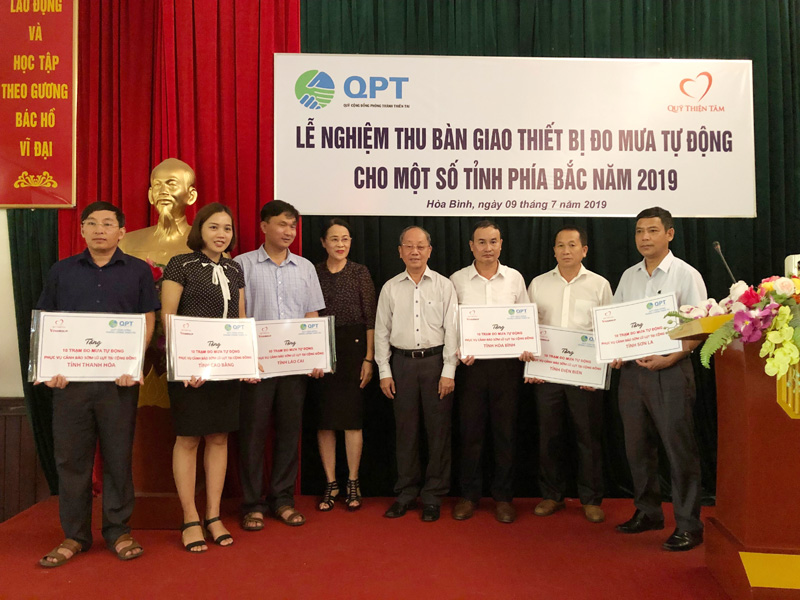
(HBO) - The Fund for Community-based Natural Disaster Prevention on July 9 held a ceremony in the north western province of Hoa Binh to hand over automatic rain gauge systems to a number of northern provinces in 2019.
 Representative
of the fund handed over automatic rain gauge systems to the localities.
Representative
of the fund handed over automatic rain gauge systems to the localities.
The Fund for Community-based Natural Disaster
Prevention launched a programme to install 65 automatic rain gauge systems in
65 communes of Lao Cai, Dien Bien, Cao Bang, Son La, Hoa Binh, Thanh Hoa and
Nghe An provinces. To date, the installation of all systems has been completed.
The programme was carried out for 40 days,
starting from May 20. The date for completion of installation and start of
operation was June 26, which was 20 days ahead of schedule. Total cost of the
programme was 2.47 trillion VND (106.58 million USD).
Each system comprises of a rain gauge
sensor; data collection, processing and transmission sub-system and a technical
box; a rain gauge tripod mast; a management and monitoring programme for data
transmission, and a smart phone app.
In Hoa Binh, 10 systems were installed in
the districts of Cao Phong, Mai Chau, Tan Lac, Lac Son, Yen Thuy, Kim Boi,
Luong Son and Da Bac.
After the installation, the automatic rain
gauge systems in the localities were put into operation.
At the event, leaders of the fund asked the
localities to make full use of the automatic rain gauge systems in order to
issue early warnings, helping local people take the initiative during flooding
and rainy seasons and minimise damage of natural disasters.
Furthermore, maintenance is crucial to
ensure long-standing effects of the systems, and the localities should work to
raise people’s awareness of the activities of the rain gauge stations, thus
they will understand and help to maintain the systems.
The localities were also asked to submit
reports to the fund after one year of use, for assessment of the system’s
efficiency; as well as work with the fund to improve disaster preparedness for
local residents in the coming year./.
The Standing Board of the Hoa Binh provincial Party Committee has agreed in principle on a proposal by the Standing Board of the Party Committee of Hoa Binh city to gather feedback on the city’s 1:2000 zoning plan, which forms part of its broader urban development strategy.
Hoa Binh province has made notable progress in public administration reform and digital government development, with the satisfaction index among citizens and businesses reaching over 84%, according to recent government evaluations.
Thanks to great efforts by local authorities in recent times, the governance and public administration performance of Mai Chau district has been significantly improved.
In the afternoon of June 6, the Party Committee, the People's Council, the People's Committee and the Fatherland Front of Lac Son district solemnly held a meeting to celebrate the 139th anniversary of the district's founding (1886–2025) and the 79th anniversary of the establishment of the district's Party Committee (1946–2025). There was the attendance of Mr. Bui Van Thang, the Vice Chairman of the Provincial People's Council; Mr. Quach Tat Liem, the Vice Chairman of the Provincial People's Committee; Ms. Dang Bich Ngoc, the Deputy Head of the National Assembly Delegation of the province; as well as the former leaders of the province and district through various periods, who are the natives of the district.
Implementing the Politburo’s Resolution No. 57-NQ/TW on breakthroughs in science – technology, innovation, and digital transformation is a golden opportunity for the northern mountainous province of Hoa Binh to renew growth model, improve competitive edge and shorten digital gap.
Resolution 57-NQ/TW, issued by the Politburo on December 22, 2024, identifies sci-tech, innovation, and digital transformation as strategic breakthroughs to build a developed and prosperous nation. In Hoa Binh province, this spirit is not just a slogan, it’s being put into action through concrete initiatives that form a "new development triangle”: digital citizenship, digital economy, and digital administration.



 Representative
of the fund handed over automatic rain gauge systems to the localities.
Representative
of the fund handed over automatic rain gauge systems to the localities.